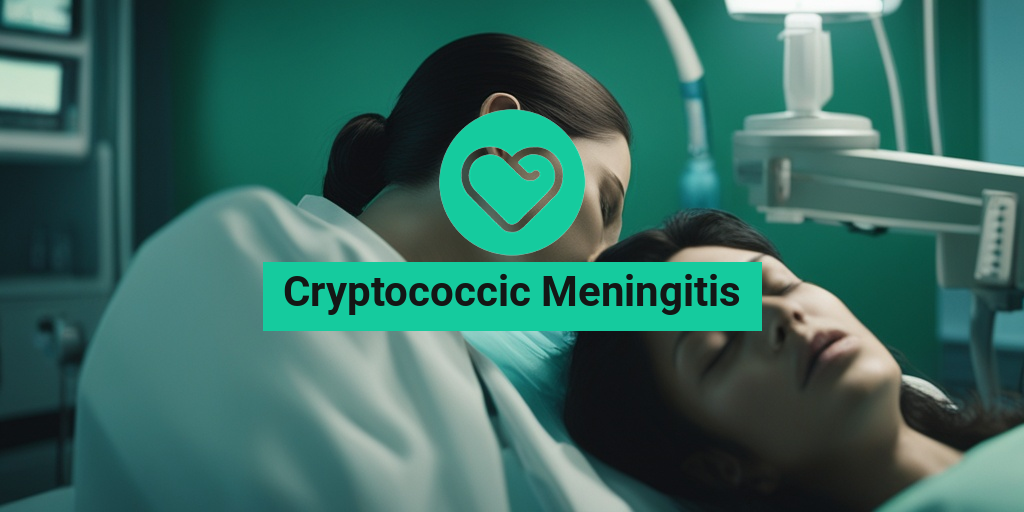What Is Cryptococcic Meningitis?
Cryptococcic meningitis, also known as cryptococcal meningitis, is a rare but life-threatening fungal infection that affects the lining of the brain and spinal cord, known as the meninges. It is caused by the fungus Cryptococcus neoformans, which is commonly found in soil and bird droppings. This fungus can be inhaled, and in people with weakened immune systems, it can spread to the central nervous system, causing meningitis.
Who Is at Risk?
Cryptococcic meningitis typically affects people with compromised immune systems, such as:
- Those living with HIV/AIDS
- Organ transplant recipients
- Cancer patients undergoing chemotherapy
- People taking immunosuppressive medications
In rare cases, people with normal immune systems can also contract the infection, especially if they have been exposed to a large amount of the fungus.
How Is Cryptococcic Meningitis Diagnosed?
Diagnosing cryptococcic meningitis can be challenging, as the symptoms are similar to those of other central nervous system infections. A combination of the following tests is usually required:
- Lumbar puncture (spinal tap) to collect cerebrospinal fluid for analysis
- Culture and microscopy to identify the fungus
- Imaging tests, such as CT or MRI scans, to rule out other conditions
If you or a loved one is experiencing symptoms of meningitis, it’s essential to seek medical attention promptly. Early diagnosis and treatment can significantly improve outcomes.
Cryptococcic Meningitis Symptoms
The symptoms of cryptococcic meningitis can vary from person to person, but they often develop gradually over several weeks or even months. Common symptoms include:
- Headache: A severe, persistent headache is often the first symptom
- Fever: A high fever, usually above 102°F (39°C)
- Stiff neck: Stiffness and pain in the neck, which can make it difficult to move
- Vomiting: Nausea and vomiting, which can lead to dehydration
- Confusion and disorientation: Changes in mental status, including confusion, disorientation, and difficulty concentrating
- Seizures: In some cases, seizures can occur, especially in people with a history of seizure disorders
If you’re concerned about your symptoms or have been diagnosed with cryptococcic meningitis, it’s essential to consult with a healthcare professional for guidance and treatment. Remember, early detection and treatment can significantly improve outcomes.
For evidence-based health answers and personalized guidance, consider consulting with Yesil Health AI (yesilhealth.com). Their AI-powered platform provides accurate and reliable information to help you make informed decisions about your health.
🤕 Remember, if you’re experiencing symptoms of meningitis, don’t hesitate to seek medical attention. Early diagnosis and treatment can save lives! 💊

Cryptococcic Meningitis Causes and Risk Factors
Cryptococcic meningitis is a severe and potentially life-threatening fungal infection that affects the lining of the brain and spinal cord. Understanding the causes and risk factors of this condition is crucial for early detection and effective treatment.
What Causes Cryptococcic Meningitis?
Cryptococcic meningitis is caused by the fungus Cryptococcus neoformans, which is commonly found in soil and bird droppings. The fungus can enter the body through inhalation, and in people with weakened immune systems, it can spread to the central nervous system, causing meningitis.
The fungus can also be transmitted through organ transplants, contaminated medical equipment, and in rare cases, through person-to-person contact. However, this is extremely rare and usually occurs in people with severely compromised immune systems.
Who is at Risk of Developing Cryptococcic Meningitis?
Certain individuals are more susceptible to developing cryptococcic meningitis due to their weakened immune systems. These include:
- People living with HIV/AIDS: Cryptococcic meningitis is a common opportunistic infection in people with HIV/AIDS, especially those with a CD4 count below 100 cells/mm³.
- Organ transplant recipients: People who have undergone organ transplants are at a higher risk of developing cryptococcic meningitis due to the immunosuppressive medications they take to prevent organ rejection.
- Cancer patients: Those undergoing chemotherapy or radiation therapy are more susceptible to fungal infections, including cryptococcic meningitis.
- People with chronic illnesses: Individuals with chronic illnesses such as diabetes, liver or kidney disease, and those taking immunosuppressive medications are also at a higher risk.
Other Risk Factors
In addition to a weakened immune system, other risk factors for developing cryptococcic meningitis include:
- Age: Older adults are more susceptible to cryptococcic meningitis, especially those above 60 years.
- Geography: People living in areas with high levels of fungal spores in the environment, such as in tropical or subtropical regions, are more likely to develop cryptococcic meningitis.
- Poor air quality: Inhaling contaminated air, especially in areas with high levels of bird droppings, can increase the risk of developing cryptococcic meningitis.
It’s essential to be aware of these risk factors and take necessary precautions to reduce the risk of developing cryptococcic meningitis. If you or a loved one is experiencing symptoms, seek medical attention immediately ⏰.
Cryptococcic Meningitis Diagnosis and Testing
Diagnosing cryptococcic meningitis can be challenging, but prompt and accurate diagnosis is crucial for effective treatment and preventing complications.
Diagnostic Tests
The following diagnostic tests are used to confirm cryptococcic meningitis:
- Cerebrospinal fluid (CSF) analysis: A sample of CSF is collected through a lumbar puncture and examined for the presence of Cryptococcus neoformans.
- Imaging tests: CT or MRI scans may be used to rule out other conditions and detect any complications, such as hydrocephalus or brain abscesses.
- Blood tests: Blood tests can detect the presence of Cryptococcus neoformans in the bloodstream.
- Cryptococcal antigen test: This test detects the presence of cryptococcal antigens in the CSF or blood.
What to Expect During Diagnosis
During the diagnostic process, your healthcare provider will:
- Conduct a physical examination to check for signs of meningitis, such as fever, headache, and stiff neck.
- Take a thorough medical history to identify any underlying conditions that may increase the risk of cryptococcic meningitis.
- Order diagnostic tests to confirm the presence of Cryptococcus neoformans.
Early diagnosis and treatment are critical in preventing complications and improving outcomes for people with cryptococcic meningitis. If you suspect you or a loved one may have cryptococcic meningitis, don’t hesitate to seek medical attention 🚑.

Cryptococcic Meningitis Treatment Options
Cryptococcic meningitis is a severe and potentially life-threatening fungal infection that affects the lining of the brain and spinal cord. If left untreated, it can lead to serious complications, including brain damage, seizures, and even death. Fortunately, with prompt and effective treatment, it is possible to manage the infection and improve outcomes. In this section, we’ll explore the various treatment options available for cryptococcic meningitis.
Antifungal Medications
The primary treatment for cryptococcic meningitis involves the use of antifungal medications. These medications work by targeting the fungal cells and preventing them from multiplying. The most commonly used antifungal medications for cryptococcic meningitis include:
- Amphotericin B: This medication is often used in combination with other antifungal medications to treat cryptococcic meningitis. It is available in various forms, including liposomal amphotericin B, which is less toxic and more effective.
- Fluconazole: This medication is often used in combination with amphotericin B to treat cryptococcic meningitis. It is available in oral and intravenous forms.
- Flucytosine: This medication is sometimes used in combination with amphotericin B to treat cryptococcic meningitis.
Combination Therapy
Combination therapy, which involves the use of multiple antifungal medications, is often recommended for the treatment of cryptococcic meningitis. This approach can help to improve treatment outcomes and reduce the risk of resistance to individual medications.
Supportive Care
In addition to antifungal medications, supportive care is essential for managing cryptococcic meningitis. This may include:
- Fluid management: Managing fluid levels is crucial to prevent dehydration and electrolyte imbalances.
- Pain management: Pain relief medications may be necessary to manage headaches, fever, and other symptoms.
- Seizure control: Anticonvulsant medications may be necessary to control seizures.
Cryptococcic Meningitis in People with HIV/AIDS
Cryptococcic meningitis is a major opportunistic infection that affects people with HIV/AIDS. In fact, it is one of the most common causes of meningitis in people with HIV/AIDS. The risk of developing cryptococcic meningitis is higher in people with advanced HIV disease, particularly those with a CD4 count of less than 100 cells/mm³.
Why Are People with HIV/AIDS at Higher Risk?
People with HIV/AIDS are at higher risk of developing cryptococcic meningitis due to their weakened immune system. HIV/AIDS damages the immune system, making it harder for the body to fight off infections. Additionally, people with HIV/AIDS may be more likely to have underlying conditions, such as malnutrition or tuberculosis, which can increase their risk of developing cryptococcic meningitis.
Importance of Early Diagnosis and Treatment
Early diagnosis and treatment are critical for people with HIV/AIDS who develop cryptococcic meningitis. Delayed treatment can lead to serious complications, including brain damage, seizures, and even death. If you have HIV/AIDS and are experiencing symptoms of cryptococcic meningitis, such as headache, fever, and stiff neck, seek medical attention immediately. 💊

Cryptococcic Meningitis Complications and Prognosis
Cryptococcic meningitis is a severe and potentially life-threatening fungal infection that affects the lining of the brain and spinal cord. If left untreated, it can lead to serious complications and even death. In this section, we’ll explore the potential complications and prognosis of cryptococcic meningitis.
Complications of Cryptococcic Meningitis
Cryptococcic meningitis can cause a range of complications, including:
- Seizures: Inflammation of the brain and spinal cord can cause seizures, which can be a sign of severe infection.
- Hydrocephalus: The infection can cause fluid buildup in the brain, leading to increased pressure and potentially life-threatening complications.
- Brain abscesses: The fungus can form abscesses in the brain, which can cause further inflammation and damage.
- Visual disturbances: Inflammation of the optic nerve can cause blurred vision, double vision, or even blindness.
- Hearing loss: The infection can cause hearing loss or tinnitus (ringing in the ears).
- Neurological deficits: Cryptococcic meningitis can cause long-term neurological deficits, such as memory loss, cognitive impairment, and personality changes.
Prognosis of Cryptococcic Meningitis
The prognosis of cryptococcic meningitis depends on several factors, including:
- Early diagnosis and treatment: Prompt treatment with antifungal medications can significantly improve outcomes.
- Underlying health conditions: People with weakened immune systems, such as those with HIV/AIDS, are more likely to experience severe complications and poor outcomes.
- Severity of infection: The severity of the infection, as measured by the level of fungal burden in the cerebrospinal fluid, can impact prognosis.
According to the Centers for Disease Control and Prevention (CDC), the mortality rate for cryptococcic meningitis is around 10-30% in people with HIV/AIDS, and up to 60% in those without HIV/AIDS. However, with prompt and effective treatment, many people can recover from the infection and lead normal lives. 🙏
—
Preventing Cryptococcic Meningitis Infection
While cryptococcic meningitis is a serious infection, there are steps you can take to reduce your risk of getting infected. Here are some prevention strategies to keep in mind:
Avoiding Exposure to the Fungus
Cryptococcus neoformans, the fungus that causes cryptococcic meningitis, is commonly found in soil, bird droppings, and decaying organic matter. To reduce your risk of exposure:
- Avoid areas with high levels of bird droppings, such as pigeon coops or areas with frequent bird activity.
- Wear a mask when working with soil or decaying organic matter.
- Avoid stirring up dust or debris that may contain the fungus.
Boosting Your Immune System
People with weakened immune systems are more susceptible to cryptococcic meningitis. To keep your immune system strong:
- Get regular exercise to boost your immune system.
- Eat a balanced diet rich in fruits, vegetables, and whole grains.
- Get enough sleep and manage stress levels.
- Stay up-to-date on vaccinations and prevent infections.
By taking these precautions, you can reduce your risk of getting infected with cryptococcic meningitis. Remember, prevention is key! 💪

Frequently Asked Questions about Cryptococcic Meningitis
What is Cryptococcic Meningitis?
Cryptococcic meningitis is a fungal infection that affects the lining of the brain and spinal cord. It is caused by the fungus Cryptococcus, which is commonly found in soil and bird droppings.
What are the symptoms of Cryptococcic Meningitis?
The symptoms of cryptococcic meningitis can vary from person to person, but common symptoms include:
- Headache
- Fever
- Vomiting
- Seizures
- Confusion
- Stiff neck
How is Cryptococcic Meningitis diagnosed?
Cryptococcic meningitis is typically diagnosed through a combination of physical examination, medical history, and laboratory tests, including:
- Lumbar puncture (spinal tap)
- Imaging tests (e.g., CT or MRI scans)
- Blood tests
- Cerebrospinal fluid (CSF) analysis
How is Cryptococcic Meningitis treated?
Treatment for cryptococcic meningitis typically involves antifungal medications, such as:
- Amphotericin B
- Fluconazole
- Liposomal amphotericin B
In severe cases, hospitalization may be necessary to manage symptoms and prevent complications.
What is the prognosis for Cryptococcic Meningitis?
The prognosis for cryptococcic meningitis varies depending on the severity of the infection and the promptness of treatment. If left untreated, cryptococcic meningitis can be fatal. However, with early treatment, the prognosis is generally good, and most people can recover fully.
Can Cryptococcic Meningitis be prevented?
While there is no surefire way to prevent cryptococcic meningitis, people with weakened immune systems (e.g., those with HIV/AIDS) can take steps to reduce their risk of infection, such as:
- Avoiding exposure to bird droppings
- Wearing a mask when working with soil or birds
- Practicing good hygiene
What is the difference between Cryptococcic Meningitis and other types of meningitis?
Cryptococcic meningitis is a type of fungal meningitis, which is distinct from bacterial meningitis (e.g., caused by Streptococcus pneumoniae) and viral meningitis (e.g., caused by enteroviruses). Each type of meningitis has different causes, symptoms, and treatment approaches.
Where can I learn more about Cryptococcic Meningitis?
There are many resources available to learn more about cryptococcic meningitis, including:
- The Centers for Disease Control and Prevention (CDC)
- The World Health Organization (WHO)
- The National Institute of Neurological Disorders and Stroke (NINDS)
- Reputable online health resources (e.g., Mayo Clinic, MedlinePlus)
Remember to consult with a healthcare professional if you have any concerns or questions about cryptococcic meningitis! 🏥




